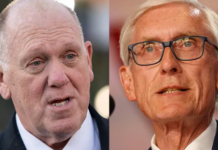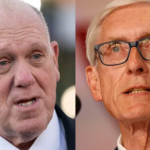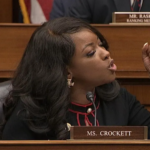
President Donald Trump’s swipe at Rep. Jasmine Crockett (D-TX) during his interview with NBC’s Kristen Welker has ignited a fresh round of partisan fireworks, thrusting an emerging Democratic figure into the center of a political and cultural showdown. What began as a comment about the current disarray in Democratic leadership has now ballooned into a broader debate about rhetoric, race, and the performative arms race that defines modern politics.
During his sit-down with Welker, Trump dismissed any clear Democratic leader before turning his attention to Rep. Crockett:
“They have a new person named Crockett… she’s definitely a low-IQ person, and they said she’s the future of the party.”
The comment triggered immediate backlash, particularly from Democratic circles, with critics labeling it racist and misogynistic. But as Trump’s defenders were quick to point out, he didn’t reference race—he used the same kind of insult he’s deployed against opponents of every background. Whether that defense is taken in good faith depends largely on political perspective, but what’s clear is this: Trump knows exactly what he’s doing. Elevating Crockett, a firebrand from Texas who thrives on camera and online, helps him frame Democrats as led by unpolished radicals, which plays well with his base.
Rep. Crockett, meanwhile, wasted no time responding. In a commencement address at Tougaloo College in Mississippi, she leaned into themes of resistance, exclusion, and systemic racism:
“Jim Crow never died. He just lied and wait.”
She followed it with a veiled warning about folding chairs—referencing civil rights protest tactics—and declared that those suggesting she’s a “diversity hire” are actually echoing the same mindset as those who once used racial slurs openly.
But what could have been a powerful moment of uplift came off more like a stump speech in a gown. Her cadence, broken transitions, and oddly phrased declarations like “we know how to use a chair, whether we pullin’ it up or doin’ somethin’ else with it,” drew confusion and concern more than applause. The dramatic pause for music after a motivational misfire only heightened the awkwardness.
Trump: I look at the Democrats, they have a new person named Crockett. I watched her speak the other day and she’s definitely a low I.Q. Person pic.twitter.com/YpX2Jhneu8
— Acyn (@Acyn) May 4, 2025
Trump’s criticism—harsh as it may be—targets a political vulnerability. Crockett is positioning herself as the voice of a new generation, but her messaging frequently leans on grievance over governance. Her rise through media interviews, late-night TV spots, and rhetorical showdowns has made her a symbol of a party increasingly driven by cultural combat rather than policy coherence.
This is precisely the ground Trump wants Democrats to fight on: emotion-heavy, identity-first, and primed for polarization. Crockett plays that part with enthusiasm, but the risk for Democrats is that she becomes the face of the party by default, rather than by merit.
🚨NEW: Donald Trump has attacked Rep. Jasmine Crockett in his latest interview with NBC, calling her “a low I.Q. Person.”
RETWEET if you stand with @RepJasmine against these racist attacks! pic.twitter.com/WA39YbF2WU
— Protect Kamala Harris ✊ (@DisavowTrump20) May 4, 2025
Let’s be clear: Trump’s mention of Crockett wasn’t random—it was intentional narrative warfare. As the Republican frontrunner works to define his general election opponent, he’s eager to elevate figures like Crockett who embody what he wants swing voters to fear: radicalism, division, and cultural overreach.
He’s not afraid of Crockett—he’s using her. By baiting her into conflict and amplifying her reactions, he paints a picture of a Democratic Party more interested in identity and protest than prosperity and unity.
Rep. Jasmine Crockett gives advice to black students: “Use a chair” against haters pic.twitter.com/oZqA7SlwWg
— End Wokeness (@EndWokeness) May 5, 2025
And it’s working. Crockett, ambitious and media-savvy, has taken the bait—and in doing so, risks becoming a caricature of what Trump wants voters to reject.








